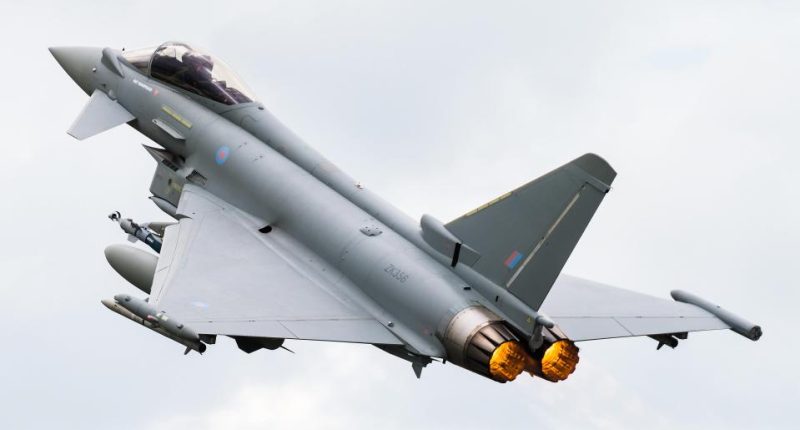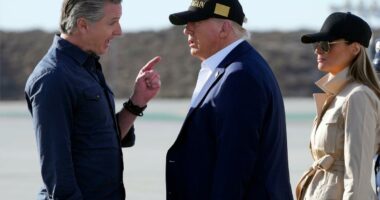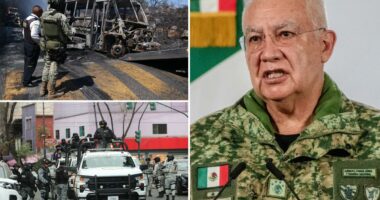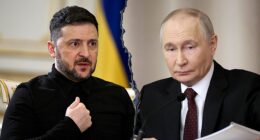Share this @internewscast.com
According to Sir Keir Starmer, British fighter jets are being dispatched to the Middle East to safeguard the UK’s military interests as tensions between Israel and Iran intensify.
The Prime Minister bolstered our military presence in the region after Tehran warned the UK that our bases and ships are at risk.
The situation worsened when Iranian state media announced that military bases belonging to the US, UK, and France would be targeted if they interfered with Iran’s drone and missile responses.
The Prime Minister, on his way to the G7 summit in Canada, said: “I will always make the right decisions for the UK and our allies.
“We are moving assets to the region, including jets, and that is for contingency support in the region.
“I will be clear-eyed in relation to our duties and obligations and my duties as Prime Minister.”
In response to the threat, additional resources like refuelling aircraft and more fast jets will be deployed to reinforce our current military presence in the region as part of Operation Shader.
The aircraft started their preparation for heading to the Middle East on Friday morning when Ministers realised the situation was rapidly deteriorating.
It comes after Israel launched strikes on Iran’s nuclear plants which triggered Tehran to hit back across the country with ballistic missiles – raising fears of an all-out war.
Israel vowed “Tehran will burn” after they were hit with four deadly waves of missiles aimed at the Israeli Defence Force (IDF) headquarters in Tel Aviv which have killed at least three people.
Sir Keir Starmer’s intervention comes after a diplomatic blitz by telephone in the last 48 hours to the leaders of the US, Saudi Arabia and Israel, to calm tensions.
Speaking about his conversation with Donald Trump, the PM added: “I’ve obviously discussed that with President Trump yesterday, as you would expect, and what the possible routes to de-escalation are given the situation, we find ourselves in.
“I think there’s a widespread concern about escalation, everybody can see what’s going on and it can have on the region and beyond the region is obvious.”
The PM insisted he will be holding “intense negotiations” face-to-face with fellow leaders at the G7 on Sunday.
He refused to get into any detail on whether he knew about the Israel attack in advance.
He said: “We do have long standing concerns about the nuclear program Iran has.
“We do recognize Israel’s right to self-defence, but I’m absolutely clear that this needs to de-escalate.
He continued: “There is a huge risk of escalation for the region. More widely in terms of conflict, you can see the impact already on the economy and oil prices.
“And of course, all of this is linked to what’s going on in Gaza. So you can see why my strong position is this needs to de-escalate, and that is the primary focus of the discussions that I’ve been having and will continue to be.”
Foreign Secretary David Lammy had conversations with representatives from Iran, Jordan and Saudi Arabia as well as European foreign ministers on Friday.
Tensions between Israel, the US and Iran have ramped up in recent weeks, amid negotiations over the Iranian nuclear deal – which is aimed at stopping the country from developing nuclear weapons.
The Iranian ballistic missile strikes on Israel descended on the civilian population across the country and managed to severely damage some neighbourhoods in Tel Aviv.
The country’s defence minister Israel Katz said Iran “crossed red lines after it dared to attack the civilian population” and will now “pay a heavy price for it”.
He added: “If Khamenei continues to fire missiles at the Israeli home front, Tehran will burn.”
Russian President Vladimir Putin discussed the conflict between Israel and Iran, as well as efforts towards a Ukraine settlement in a phone call with US counterpart Donald Trump, Russian state media reported Saturday.
“The dangerous escalation in the Middle East was of course at the centre of the exchange,” the agencies cited the Kremlin as saying.
It added that Putin also informed Trump about the “implementation of the agreements reached at the meeting between the Russian and Ukrainian delegations in Istanbul on June 2”.
























